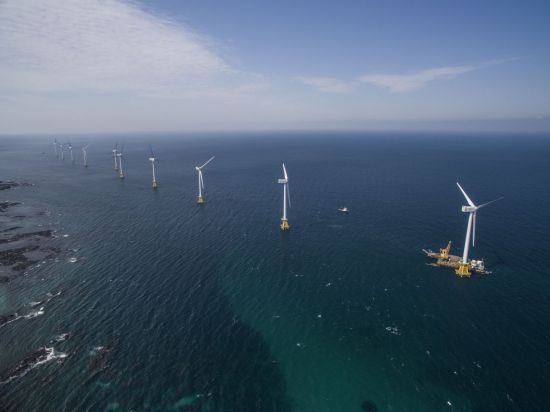Jeju renewable energy output control 3 times in 2015 → 77 times last year
Power control of 4~5% of wind power generation in Britain and Korea
Government, surplus power → hydrogen and heat energy conversion and land transmission

[세종=아시아경제 권해영 기자] In Jeju Island, new and renewable energy such as solar and wind power is being produced in excess of demand. The government plans to convert the surplus power into hydrogen and heat energy to utilize it, and to transfer it to land to alleviate the problem of oversupply. The problem of limiting the output of renewable energy is expected to be a task for the Korean government to solve for carbon neutrality in 2050.
According to the Ministry of Trade, Industry and Energy on the 10th, the share of renewable energy generation output in Jeju Island was 16.2% last year. With the increase in renewable energy facilities in Jeju Island, this proportion is steadily increasing to 9.3% in 2015, 13.2% in 2017, and 14.4% in 2019.
The problem is the overproduction of renewable energy power in Jeju Island. This is because the supply of new and renewable energy facilities has been greatly increased in the process of promoting the’Carbon Free Island 2030′, which covers 100% of Jeju’s electricity demand with renewable energy by 2030. A power outage occurs even if the power is insufficient, but an overload can cause a power outage due to an overload in the power system. To prevent this, the number of regenerative energy output controls in Jeju Island has increased significantly from 3 in 2015 to 77 last year. Power control leads to damage to renewable energy companies. Above all, in the process of implementing carbon neutrality in 2050, the problem of surplus power in renewable energy can spread to all regions, so it is urgent to solve it.
Of course, it is not limited to Korea. Major countries of overseas renewable energy are also implementing power restrictions due to oversupply of power. As of 2016, Germany implemented an output control of 4.36% of the total wind power generation and the UK was 5.64%.
The government is seeking various ways to utilize surplus power in order to minimize the control of the renewable energy output in Jeju Island.
The Ministry of Industry, along with the Jeju Provincial Office, plans to minimize the required operation generator, install an energy storage system (ESS) for system stabilization, and increase the capacity to accommodate renewable energy through #1 HVDC reverse transmission, and minimize the output control this year. It is planning to discover new flexible resources by first applying P2G technology to convert to hydrogen using surplus power from renewable energy, P2H technology to convert to heat, and V2G technology to use electric vehicles as ESS.
Lee Ho-hyun, director of energy innovation policy at the Ministry of Industry, said, “Because power must always meet the supply and demand, controlling generators to meet power demand is a common matter that applies to all generators as well as renewable energy.” We will review the cost-effective output control plan by improving the principles and detailed measures and related market systems.”
Reporter Kwon Hae-young [email protected]
